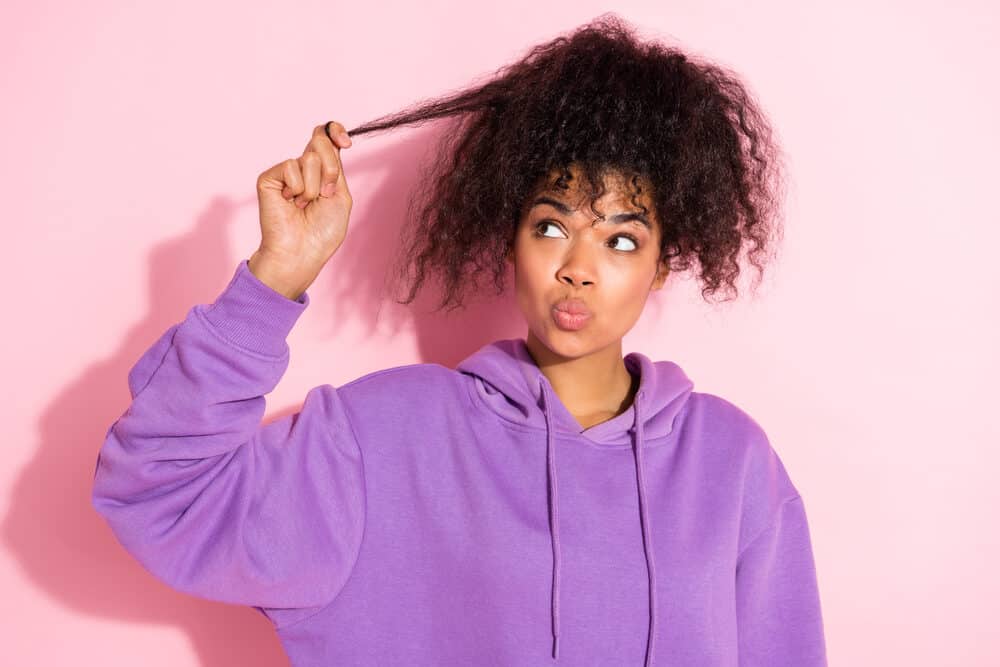
Chances are you’ve heard about Head & Shoulders, whether it be from a commercial, a friend, or even through personal use. The product line has been around for decades, and people of all backgrounds use it to keep dandruff away and promote hair and scalp health.
Though the brand is by no means new, many still have reservations about it. What people wonder is, “Does Head and Shoulders cause hair loss?”
In this article, we’ll explore Head & Shoulders in detail to give you a concrete answer. Let’s get right into it!
Table of Contents
Background on Head and Shoulders and Their Products
Head & Shoulders was launched in the 1960s and has achieved the title of America’s #1 Dandruff Shampoo.
The brand started off as a single dandruff shampoo but has since expanded to a full line of hair care solutions for ailments stemming from scalp sensitivity and flaking to dry and itchy scalp.
There are now more than 80 products available on the company’s website. Here are some of the most popular ones, along with the most pertinent claims made by Head & Shoulders:
Head & Shoulders Clinical Strength Dandruff Shampoo
Clinical Dandruff Defense Advanced Oil Control - An anti-dandruff shampoo specifically formulated for people with excess scalp oil production. It’s got 1% selenium sulfide, which dermatologists regularly prescribe for people with dandruff.
It’s not your average dandruff shampoo - it’s got 35% more dandruff fighting effectiveness than competing dandruff shampoos. The aloe vera in the formula also helps to hydrate the scalp and hair as you wash.
Head and Shoulders Shampoo, Anti Dandruff Treatment
Classic Clean Daily Shampoo - A basic dandruff shampoo designed for all hair types. It’ll work for virtually anyone who’s dealing with dandruff, whether you have curly, straight, or color-treated hair.
The formula features pyrithione zinc (also known as zinc pyrithione) to stop flaking, itching, and other dandruff symptoms that stop you from feeling and looking your best. This shampoo is gentle enough for daily use.
Head and Shoulders Moisture Care 2-in-1 Anti-Dandruff Shampoo + Conditioner
Moisture Care 2 in 1 Shampoo and Conditioner - A shampoo/conditioner duo created to fight dandruff without drying out the hair and scalp. It’s perfect for anyone who deals with hair or scalp dryness. People with all hair types (curly, coily, straight, colored, bleached, etc.) can use it.
Head & Shoulders Royal Oils Moisture Shampoo and Conditioner Bundle
Royal Oils Moisture Shampoo and Conditioner - A dandruff shampoo and conditioner bundle that supports scalp and hair health by promoting balance. It’s made especially for people with curls and coils, featuring ingredients like coconut oil and cetyl alcohol.
It’s also free of parabens and dyes. Use it twice a week or more to keep your scalp moisturized, nourished, and dandruff-free.
Head and Shoulders Hair Loss Claims
Negative claims fly in all directions when it comes to Head & Shoulders. Many people believe the products cause hair loss, and here are some rationales behind this belief:
- Ingredients that cause skin irritation - Skin irritation can lead to breakouts on the scalp and result in infections that can cause hair loss. Some people are more sensitive to certain ingredients.
- Long ingredient list - Head and Shoulders products come with a very long list of ingredients. When people use the products and experience hair loss afterward, they assume that one of the many ingredients in the Head and Shoulders product could be to blame for it.
- Potent formula - Head and Shoulders shampoos are strong, so people often assume that their hair loss occurred because the shampoo was too harsh on their hair or scalp.
On top of that, many make cause-and-effect associations that are not always valid. Some who suffer from dandruff and then try Head and Shoulders products experience hair loss. Naturally, they blame the last product that they began using.
These are just a few reasons why people attribute their hair loss to Head and Shoulders. As we go further into the article, we’ll determine whether these theories have any factual basis.
Does Head and Shoulders Cause Hair Loss?
Head and Shoulders products have not been found to cause hair loss, but this doesn’t mean that the products are not to blame. Head and Shoulders products can cause many issues, some of which could indirectly lead to hair loss. Not all the ingredients in the products are necessarily bad for the hair, but they could make you more likely to experience hair loss.
Non-Water-Soluble Silicones
Silicones are found in a ton of different hair care products. They make the hair smoother and shinier, and they provide a layer of protection against external elements (pollution, harsh winds, etc.).
There are two types of silicones, water-soluble and non-water-soluble. The water-soluble silicones rinse out quickly with water and a mild shampoo.
The Non-water-soluble silicones are much harder to wash out. Because of this, they tend to build up on the hair, making it heavier and more prone to drying out due to a diminished ability to receive moisture.
Many Head and Shoulders products contain non-water-soluble silicones, like dimethicone, which could suffocate your hair over time and cause hair loss as a result.
Sulfates
Sulfates are found in the vast majority of Head and Shoulders products. They are cleansers that help remove dirt and debris from the hair and scalp.
When used sparingly, sulfates won’t likely harm the hair. But if you use them regularly, especially if you have curly hair, it could leave your strands parched.
Chronically dry hair can lead to brittleness, which can result in thinning hair from breakage.
What’s more, is that sulfates can be irritating to the skin. And this irritation can manifest in bumps, blisters, itching, and more. Excessive scratching and sores from irritation can damage hair follicles and lead to hair loss.
Note: Most people tolerate sulfates without any skin-related issues. But some people are sensitive to sulfates; such people should avoid them at all costs. You won’t know if you’re allergic or sensitive to sulfates unless you try them.
Artificial fragrances
Artificial fragrances pop up in some of our most fragrant natural hair products, but most have no idea that they could be doing their hair and scalp harm.
The components that make up these man-made fragrances are not disclosed on the package, so there’s no way to know what’s really in them.
Furthermore, if a company lists “fragrance” near the top of the ingredient list, that means there’s a lot of it in the product.
In this case, either the manufacturer was going for a strong scent for customer appeal or trying to cover up the offensive smell of other ingredients.
Artificial fragrances are notorious for containing ingredients that are skin irritants. So, if you apply a product with a synthetic fragrance to your hair, you could experience skin irritation, and it can snowball into a rash, or worse - hair loss.
What’s more is that these fragrances are usually petroleum-based, and petroleum-based products have been proven to be potentially harmful to the human body.
Most, if not all, Head and Shoulders shampoos and conditioners have artificial fragrances.
Methylchloroisothiazolinone and Methylisothiazolinone
These two preservatives are often used together in hair products. They are great at minimizing bacterial growth over time, and they don’t usually cause skin irritation.
However, both of them are known to result in allergic reactions in susceptible people, and Head and Shoulders seconds this claim.
If your scalp is not sensitive to these chemicals, they probably won’t harm your skin. But if you do develop contact dermatitis due to either of them, you could experience hair loss as a secondary effect.
These preservatives are found in most, if not all, of Head and Shoulders products.
Sodium Chloride
We’ve all had sodium chloride in some form - it’s the same thing as table salt. In food, it’s okay to use in moderation, but when it appears on your hair product ingredient list, there’s an issue.
Sodium chloride is extremely drying to the hair. It can quickly turn adequately moisturized hair dry and crunchy.
This may not be as big a deal to people with loose curls or straight hair since oily hair is a pertinent concern for them. But if your hair is curly, it’s already prone to dryness, and adding salt to the mix may only make it worse.
Dry hair often lacks elasticity and breaks easily, which is why we see dry hair break off at a much higher rate than hydrated hair. Moreover, salt can dry out your scalp, especially if the other ingredients in the shampoo formula aren’t moisturizing enough to counteract it.
A dry scalp cannot function as well as a hydrated, nourished one. Not to mention the fact that a dry scalp itches, prompting scratching that can damage the hair follicles. It’s a brutal domino effect.
Head and Shoulders regularly uses salt in their products. If you use a Head and Shoulders product and experience severe hair or scalp dryness afterward, you should not continue using the products.
Head and Shoulders Contains Some Questionable Ingredients
Between the silicones, salt, and sulfates, Head and Shoulders definitely could do some harm to your hair and scalp. The rumors about the shampoos being harsh are not unfounded.
Gentle shampoos are sulfate and silicone-free and packed with moisturizers to keep your hair and scalp moisturized and healthy. Head and Shoulders shampoos and conditioners are, by comparison, very strong.
And while Head and Shoulders products are not necessarily formulated to cause sudden and widespread hair loss, you’ve got to pay very close attention to your hair and scalp while using them.
Some of the ingredients could cause hair loss due to skin irritation or chronic hair dryness from continued use.
Dandruff Itself Can Cause Hair Loss
Now, onto another issue that must be addressed to be fair. Though Head and Shoulders products aren’t perfect, they receive a lot of false blame.
The thing is that dandruff itself can cause hair loss. If this is surprising to you, you need to read this entire section.
For most people, dandruff is no more than a minor inconvenience. But some people are made to deal with the harshest symptoms of the condition at high severity. Here are some of the main symptoms of dandruff:
- Flaking - There may be tiny white dandruff flakes in mild cases or much larger, thicker ones in more severe cases. These flakes may also vary in their oiliness. The worst flakes are yellow and greasy.
- Redness - Your scalp may turn red due to the irritation from the condition and any outside elements that damage it.
- A persistent itch - Dandruff often causes an itchy scalp. The itching may be so bad that you break your skin whenever you scratch it.
Mild dandruff does not usually result in hair loss, so if you have a mild case and experienced hair loss, the dandruff is likely not the culprit.
Although if you have severe dandruff and you scratch your scalp incessantly, this could be the culprit you were looking for. Excessive scratching is a very real driver of hair loss.
How Scratching Causes Hair Loss
Occasional scalp scratching may not damage your scalp at all, but when you go to town digging into your scalp, you are likely doing some damage to it.
When you scratch your scalp too hard or too often, several things can happen:
- Your scalp may bleed and then scab over.
- The open skin can be invaded by bacteria and cause an infection.
When your scratching damages your scalp or results in an infection that affects the hair follicles, you could be in for serious hair issues.
Note: Though hair loss and dandruff are linked, experiencing hair loss from dandruff is not very common. But you’re more likely to experience hair loss as a result of dandruff if you have a severe case and have not yet begun using an effective hair loss treatment.
Other Causes of Hair Loss
In addition to dandruff and questionable hair care ingredients, there could be several other things to blame for hair loss. We’ll take a quick look at them in this section.
Scalp Psoriasis
Scalp psoriasis is a common condition resulting in raised irritated scalp skin and flakes. The flakes may be red, which is a sign of irritation. The condition is known to cause some degree of hair loss or thinning.
If you have this condition instead of dandruff, this could be the cause of your hair loss. You’ll be relieved to know that the hair usually grows back after successfully treating the condition.
Traction Alopecia
If you regularly wear your hair in protective styles and end up with hair loss, it could be traction alopecia. Traction alopecia is a condition where the hair falls out at the roots due to follicular tension.
You’ll know that you have traction alopecia if the hair loss occurs around the perimeter of your head and initially presents with small bumps.
The risk of developing traction alopecia increases exponentially when you wear your hair in tight box braids or sew-ins. But you can also develop it by wearing your hair in the same style all the time - a high or low bun every day, for example.
Traction alopecia may resolve itself if you stop wearing your hair in problematic styles, but it’s not guaranteed. Sometimes, there’s nothing you can do about it after the damage is done.
Allergic reactions
Allergic reactions often lead to scalp itchiness and inflammation. In the worst cases, they can lead to hair loss. The hair loss can be spontaneous, or it may be caused by scratching due to the constant itching.
How to Remedy Hair Loss
If you have used Head and Shoulders and are now experiencing hair loss, you need a solution ASAP. The thing about hair loss is that many different things can cause it (more than we’ve listed in the previous sections).
So, no single remedy will stop hair loss for every individual. Still, everyone can do some general things to reduce the risk of developing hair loss.
- Avoid hair and scalp products with known skin irritants.
- Try over-the-counter hair loss medications like minoxidil or finasteride.
- Always style your hair loosely. Tight styles can stifle your hair growth progress.
- Keep your hair’s moisture and protein levels in check by moisturizing your hair when it feels dry and doing a protein treatment every so often to keep it strong.
- Oil your scalp a couple of times per week to keep it moist. Every time you apply oil to it, massage it for a minute or two to stimulate blood flow to your follicles.
If you’ve tried the above remedies and aren’t seeing the results you’d like, perhaps it's time to see a dermatologist for a professional opinion.
The dermatologist will take a good look at your hair and scalp and diagnose any issues standing in the way of healthy hair growth.
They can then draft a customized treatment plan and prescribe any medication you may need to jumpstart hair regrowth (or directly promote hair growth).
- Will My Hair Fall Out If I Bleach It?
- Why Does My Hair Fall Out When I Wash It?
- Does Dimethicone Cause Hair Loss?
- Does Amlodipine Cause Hair Loss?
To sum things up, although Head and Shoulders has not been proven to cause hair loss, there are several ways that its use can indirectly lead to hair loss. We advise you to use the brand’s products carefully and be mindful of how your hair reacts. Good luck!











